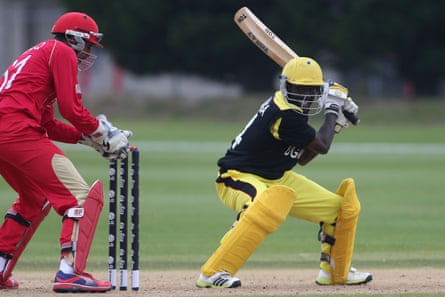The nets at the Lugogo Cricket Oval in Kampala, the capital of Uganda, are not ideal for a budding fast bowler. The lanes are set up on a concrete slab that only allows for a spinner’s run-up. Any brave soul wanting to fling the ball at pace has to negotiate an awkward step between the barren patch of land that borders the cricket field and the platform upon which the weathered nets reside. Mind your ankles.
But on a visit to the country nine years ago, I was struck by the queues of bowlers forming under the late afternoon sun, unperturbed by the prospect of injury as they skipped in to bowl. Some even donned Uganda shirts. This is a ground that could do with a lick of paint but it can also lay claim to being the home of cricket in Uganda, having hosted men’s and women’s internationals.
“I wouldn’t say we have the greatest facilities in the world,” says Brian Masaba, captain of Uganda’s men’s side. “It’s nothing short of a miracle that we’ve made it.” He is referring to his team’s qualification for the T20 World Cup, their first appearance at the tournament. After upsetting Test nation Zimbabwe at last year’s Africa Qualifier in Namibia, New Zealand and West Indies, as well as Afghanistan and PNG, await as opponents in the Caribbean. “The best teams in the world, the best players in the world – I couldn’t ask for more.”
Ugandan representation at a global tournament is not unprecedented, with East Africa appearing at the first men’s World Cup in 1975. Associate membership to the International Cricket Council arrived in 1998, but success has taken its time, with Lawrence Mahatlane’s reign as the men’s head coach from 2020 to 2023 seen as a turning point.
“He came with a plan that he sold to Uganda cricket of how we could be at the 2024 World Cup if we did certain things right,” says Masaba. That included rewarding players with contracts and getting on the park as much as possible: no men’s team has played more T20 internationals than Uganda since the start of 2021. Helped by regular fixtures against their weaker neighbours Rwanda and Tanzania, they have become accustomed to victory in the shortest form, with eight defeats in 59 T20Is in the past two years.
“We pride ourselves on having a very dynamic group,” says Masaba. “We probably have the most all-rounders in the world.” Included in the mix is the 43-year-old off-spinner Frank Nsubuga, in line to be the eldest player at this year’s tournament. “I’m so proud to be the oldest man in the World Cup,” says Nsubuga, who played for East and Central Africa at the 1997 ICC Trophy. “This is the dream I’ve been chasing all my life.”

The side’s vice-captain is Riazat Ali Shah, a Pakistan-born all-rounder, one of several players in the World Cup squad of south Asian origin. “These guys have become family,” says Masaba. “We’ve played with them for so long they can speak the local language and we can understand their languages as well. Don’t insult me in Hindi because I’ll understand.”
Football remains Uganda’s primary obsession, but the hope is that the World Cup appearance will boost cricket’s popularity, inviting further government support and sponsors. It is needed; with government plans announced for Lugogo to be transformed into a new sports complex that won’t house cricket, the game has to relocate.
Reaching a major tournament is already paying off, though. “Because we qualified for the World Cup the government ensured that even if we’re leaving Lugogo they have to find us another place for us to be able to play,” says Denis Musali of the Ugandan Cricket Association.
Access to equipment has been an issue, too, but that has been partly addressed with the help of a club in Sydney. Brian Freedman was managing Australia at the Under-19s World Cup in 2004 when he came across a Ugandan side making their first appearance at the tournament. “They were a lovely group of kids,” he says. “We started talking to their management and they explained how difficult it was with no equipment and no money.”
after newsletter promotion
While attending one of Uganda’s games, Freedman saw the reality. Kit was being shared as players went out to the middle. “As the kids were going out to bat for their country, they were swapping bats and helmets at the gate.”
After the tournament, Freedman approached his club, Bankstown District, and began a project collecting equipment to be sent over to Uganda. Since 2005, containers of donations have made their way over featuring “everything you can imagine”. He adds: “Cricket New South Wales have been very good to us. The Sixers and Thunder, when they change uniforms each year, I get the residue of all that.”
It makes for the slightly bizarre sight of old New South Wales and Big Bash gear being worn around Lugogo, as well as the green helmets of the Australia national team. Musali says the donations have had a “massive impact”, proliferating through schools. “The current generation of players, all of them have been greatly impacted by the donations from Bankstown.”
Come the World Cup, there will be supporters at home and in a pocket of Sydney, too. “We’re thrilled,” says Freedman. “We’ve had messages going back and forth, congratulating them, and they were saying nice things about us.” Does it feel like the project has played a part in this? “It has, but it’s not about us. It’s about them.”
Source: theguardian.com


